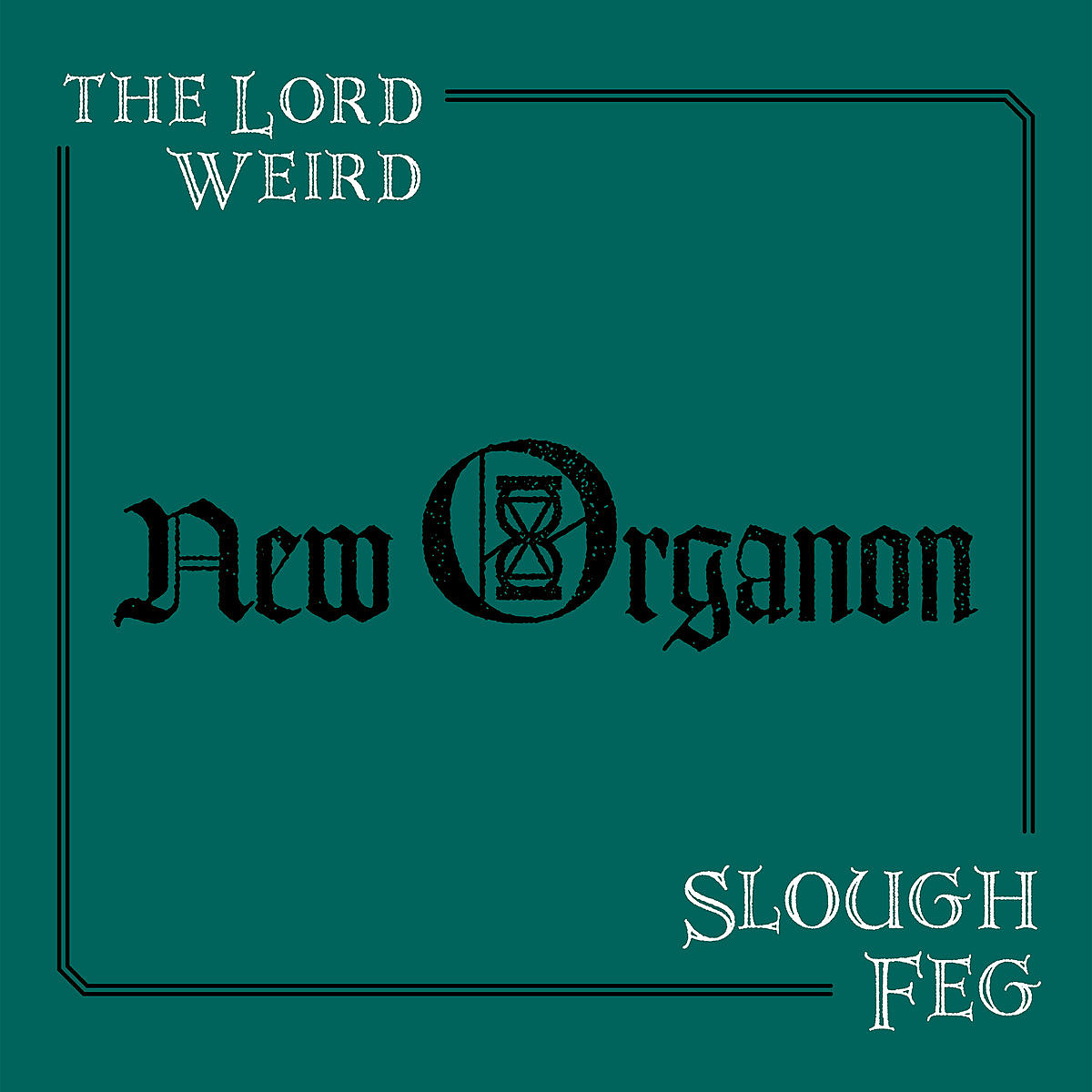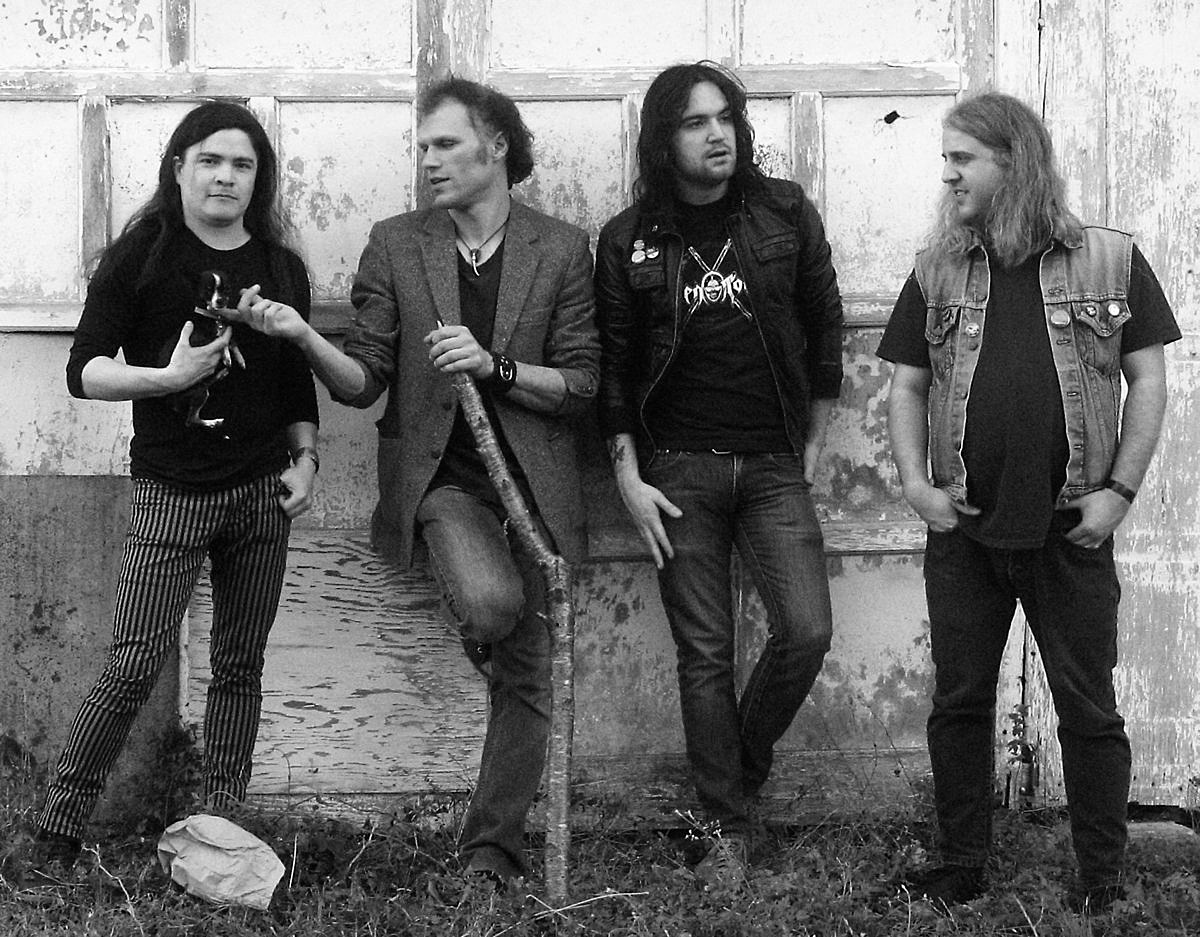
"New Organon": The Lord Weird Slough Feg's Mike Scalzi Talks Latest Album (and Philosophy)






…
While walking with Mike Scalzi from the Kung Fu Necktie — the Philly venue that was hosting The Lord Weird Slough Feg — to a cheesesteak joint nearby, the vocalist/guitarist reminisced about his past. Some of it was geographical: he lived in Pennsylvania as a youth and he had a great story about the strange night he had trying to sneak into the nearby Tower Theater to see Frank Zappa (spoiler alert: he didn’t get in).
The rest was more specific to Invisible Oranges, specifically his past as a contributor. In 2010 and 2011 he wrote a quartet of Bullpen Bulletins. All these years later, he still laughs recalling the controversy of them, specifically the first installment “Welcome to the Grind Ole Opry.” He still thinks that title was clever, and unsurprisingly continues to relish the controversy he caused within the metal community. Half of metalheads wrote him off as an old man screaming at clouds while the rest agreed with NPR’s Lars Gotrich who called it “a damning clarion call for quality control” in the metal scene.
Whether you were on his side or not (and he’ll be happy to good-naturedly discuss it either way, even to this day), it’s obvious that Scalzi is a man who walks it like he talks it. His band might have had two names — the shortened moniker Slough Feg as well as the elongated version that is back — but it has always played only one thing: traditional heavy metal that refused to consider trends or subgenres.
It was that way when he formed the band not far from Philly nearly 30 years ago, and it was that way through ten albums, the latest of which, New Organon, comes out next Friday (in America, the EU release date is today) on Cruz Del Sur Music. The album is full of the majestic riffs and pounding percussion; however, instead of using science fiction and fantasy as themes, Scalzi taps into the greats of philosophy. The title comes from Francis Bacon’s 1620 book that bridged the gap between Aristotle and the general sciences as we know them.
Stream the new album below. Between bites of cheesesteak, Scalzi was happy to dissect it and discuss Slough Feg’s place in the metallic history.
…
…
This is a great day for traditional metal in Philly. Slough Feg is in town and right down the road is the hologram of Ronnie James Dio.
It is? That’s where all the metalheads will be. I didn’t realize that. It sucks because some of those people probably would have come to our show.
Maybe some, but I was thinking like you’re a real band and he’s a hologram.
Yeah, but people usually don’t make that distinction. You’re making that distinction. I don’t think it’s going to… I don’t really have an opinion about it actually. I miss Dio. I think the important part is not what I think about but what everybody’s probably asking is what the fuck would Ronnie think about it. And I’m sure they convinced themselves that he would love it but I’m not so convinced that Ronnie would love it. But I’m not sure that he wouldn’t either. I just don’t know.
Would you want a Slough Feg Hologram tour?
I was about to bring that up! I think I’d have to say no, even though in a way it would be extremely flattering because it will never happen unless it happens to everyone. But not really. I wouldn’t do that. I’d be dead. If I can make money off it and it can happen now, sure.
The name of the new album comes from Francis Bacon. I sort of gleamed that it was this transition between Aristotle thousands of years before and the scientific method as we would come to. Am I getting that right?
I think so. I don’t know much about it as I should either, but it’s a book that I like. I wrote the song first — I didn’t know the record would be called that. The song is basically about Aristotle, there’s not much beyond that in the song, but the name “The New Organon” was Francis Bacon, he wrote the book which is a revision in a sense, written in 1627. For 2000 years before that, all through the middle ages, everything was sort of skimmed from Aristotle and philosophically and scientifically.
Everything seemed fixed. It was a different set of physical laws, if you want to call them laws, governing the heavens and the earth… very weird laws. For the major portion of western civilization that was the way things work. Francis Bacon is one of the people that we hear about now who sort of amended that saying we shouldn’t just drop in universal conclusions from these observations.
There was a primitive scientific method with Aristotle where you observe things and you focus in on the similarities and edit out the differences and then come to a conclusion. For these particular examples of things you draw universal conclusions, universal laws or general rules about the way things work and those things seemed fixed. For 2000 years those things were fixed.
Francis Bacon was one of several people who broke that open. Maybe there aren’t fixed laws the universe? And his big maneuver was to sort of implant the experimental bit into the science, so you don’t just observe things and draw a conclusion; you have to manipulate the data, mess around with it. So he did a lot of weird experimentation, doing things like freezing chickens and refrigeration.
It wasn’t easy to freeze things back in the 1600s either.
No! He died as a result actually. He got pneumonia I think sitting out in the snow, stuffing a chicken with snow. He died so every time you open your refrigerator you should see Francis Bacon!
You can infer from what I just said that this is just a fun idea to write the album about. Although it sounds dry and academic, it’s really just a lot of fun. I wrote the song about the Aristotelian method and a little bit about it being changed or revised in that way, and I threw in a lot of stuff about, you know, just textbook simple phrases, induction, the timeless forms, the square of opposition. These are sort of slightly technical terms that I use teaching this stuff, so it was going through my head a lot. I just thought it would be a fun and then the thought came in my head: why I don’t I just make the whole record or at least most of the songs about different philosophers in a fun way and a gritty way because some of the songs are about like the neighborhood we practice in and the people I see in the streets.
So the first four or five songs are just literally the names of philosophical texts except the first one called “Headhunter” which I wrote way back in 1992.
The second song, “Discourse on Equality,” is based on “Discourse on Inequality” by Jean-Jacques Rousseau about the beginnings of civilizations and contract theory, not very interesting stuff for a metal song! All the phrases you find in the book are all “I represent the civil creatures, I read forever in the state of nature.” There are things you can say in a song and they sound somewhat metal. You just kind of get in there [and] write some general ideas down about these things and as long as you sort of own it when you sing it, it sounds good and then you get some of that meaning in there.
…

…
So you started with Aristotle and you even go as far as “Coming of Age in the Milky Way” which is based on a book from 1988 by Timothy Ferris. You sort of run the gamut of human knowledge and not just in one discipline either.
I had to get a little bit of Neil deGrasse Tyson and astrophysics in there even though I know nothing about it! “Coming of Age in the Milky Way” is a textbook about that stuff and it goes the whole way back to Isaac Newton and all these guys.
I sort of threw around and played with these ideas that interest me and try to make fun songs about them. That’s about it. Just like I do about disembowelment and cattle raids and Celtic-Viking wars, it’s the same, it was just something in a book that I enjoyed studying and I guess I just dramatize it in the song. That’s about it.
At what point did you realize that the album was going to have an overriding theme? Did it all just fall into place or was there some kind of epiphany?
There wasn’t an epiphany; I had the idea for years. I actually had the idea for a much more involved project that would serve as a textbook, a CD that would serve almost like a textbook supplement where there are really specific organized instructional songs that go from the pre-Socratics and Plato and the ancient philosophy but that are actually not with this record. The main goal is to actually lay down the philosophies so you can learn from it, to give my students. That was my idea.
I had that idea for well over ten years and think it would be cool to do that, but I’ve never been able to. I never really wanted to make a Slough Feg album that was that academic and towards that kind of purpose, that didactic to use an academic word, as a teaching tool. So instead, something more organic happened which is a more realistic, metal, enjoyable record rather than the ABCs of philosophy.
And it has some songs that have nothing to do with it as well. There’s “Uncanny” written by [bassist] Adrian Maestas and “Headhunter” written by me.
“Uncanny” is actually sung by Adrian. Is that the first time since the first demo that there’s been somebody taking over lead vocals on a Slough Feg song?
We had a guest vocalist — Bob Wright of Brocas Helm [who sang “Tactical Air War” on 2010’s The Animal Spirts]. Nobody else in the band ever sang besides the original demo which was a different singer [Omar Herd]. That wasn’t a conscious decision. He had been writing these riffs and I had the song. He did not say “I’m going to sing it,” but he’s written songs before like that one that Bob Wright sang. He was a little bit… not shy but at first he was like, “you’re going to sing this, right?”
“No, I want you to sing it. I like your voice.”
Adrian and [guitarist] Angelo [Tringali] could sing some things and it takes the pressure off me. I didn’t want to be responsible for writing an entire album by myself. I’ve done it so many times. Nine records are almost everything written by me. I sang on plenty of Slough Feg songs, so he did it and he did a really good job. It sounds very different. His vocals aren’t particularly metal, which I think is cool. As far as I was concerned, it worked out great. We’re going to play it live tonight.
Your lyrics were initially rooted in science fiction and fantasy. With this album, you inject reality, and some of it is modern. I’m wondering if your life in academia is responsible for that transition.
To some extent it has to be, that it’s about philosophy and that’s what I teach. But I don’t think so; I think I would have done it anyway even if I wasn’t teaching. My academic career was getting reduced significantly in the last few years anyway. I’m not teaching as much as I used to. I teach still but not as much.
I think I would have done this no matter what. Quite frankly, I get bored rather easily like a lot of human beings. You can say that a lot of bands, the first three albums they sort of shot their load and it’s over. You keep regurgitating mediocre shit and I started seeing myself going that way.
I don’t want to fall into that trap where these bands that have been around forever. I don’t even need to tell you who specifically I am talking about who keep making records that are so bland and so pointless. I started to feel that I was going that way, and that’s a very bad thing. I hope that what people have said about this record so far, that it’s sort of a return to form, is true.
I would listen to the last album we did and go, oh god! That song should have been edited out or we should have done this differently. So this one, the motivation and one of the reasons why it took so long is because I felt like I’d said a lot of what I wanted to say in nine records. And why the hell should I say something just to say it? So I waited until I had something to say.
I enjoy writing these songs, the riffs, and the melodies come to me regardless of if I want to write songs or not. So I figured right now I want to this. I wrote a lot of songs. I had a lot of riffs that ended up on the cutting floor.
The biographic record material said that you probably wrote more for this than any other record and threw out more as well.
The approach was to do it like it was our first album in a sense. When a band does their first record or their second record, they often write the songs before they have a record, they play them out live, not always these days, but that’s how it used to be. You play them out live. You test them out. You see which ones get a good reaction. You see which ones suck. You test them in front of audiences.
We did that for a lot of these songs. I wrote “New Organon” and we played it live within a couple months and it went over well. Then we wrote “Uncanny,” Adrian’s song, and then several others and we played them live and they went over well. Last summer at this time we toured all over Europe playing three, four songs from the new album every night and they went over great. At least half the songs were tried and tested live in that way.
It sounds to me like after nine albums you felt like the band was kind of a rut that you really needed to shake things up to get out of. What caused you to feel that way?
Listening to the last few records and going, some of this doesn’t sound as inspired as I’d like it. I don’t want to play a bunch of songs from this album. I’m not crazy about it, you know. I want to enjoy the hell out of playing these songs. I want to play them live with a live band. That’s the ultimate test.
It wasn’t like bad reviews or this guy sucks, or anything like that. I’m sure some people said that, but it was more just me not being excited about some of the things we’d done, thinking I don’t want to end up like some more successful bands people put out a new album, but you go to see their old songs.
So it wasn’t a coincidence that this was the longest span between two albums since you started.
No, it wasn’t. But also, I’m older now. Life gets in the way. We all have jobs. We’re not one of those bands that tours for months and then goes, “okay we have nothing else to do, let’s make the record!” It’s a lot more difficult than that.
…

…
You hold the band and yourself to high standards. The Bacon text in “New Organum” spoke of the “Idols of the Mind,” four pretty negative traits that bog people down from enlightenment. These are easily identifiable in modern society even though he spelled it out centuries ago. Does it kind of bum you out that we’ve gone all this time and we still haven’t figured shit out yet?
Well, you have to remember that in 1620 Francis Bacon was writing this book not for the masses. He was writing them for the five people in England [who] could read it. So we’re talking about a very elite group of people who would even be able to understand what he was saying. And he would practice sometimes philosophy or science, so it’s possible that some of those things have been weeded out of the most certain academic populations or whatever. I don’t know; probably not.
Does it bum me out? Yeah, it’s ironic. This is the way we should operate and of course everybody’s still all messed up, falling into those traps. I mean, sure I am disappointed that the human race that we have all this technology that requires a lot of effort and a lot of critical thinking in order to come up with, but the people that operate it, and the people who use it don’t think critically at all. In fact it seems to be causing ignorance and I think about it all the time.
But I’ve accepted that stuff a long time ago [laughs]. So at this point, I’m not even… yeah it bothers me all the time.
Do you think Francis Bacon would like the record?
I doubt it! He would have no reference point with which to… You never know, he might. I don’t know, but it’s really possible to get that kind of progression. Probably not. He would probably say this is a degenerate form of art and I compliment you by calling it art, something like that. This is a vulgar representation, Philistines who don’t understand what’s going on here. That kind of thing.
He’d be a harsh critic.
He would.
When you started Slough Feg, it was homage to the classic metallic sounds. Now, maybe not in terms of record sales, but in terms of quality of product, the consistency, probably some influence and certainly longevity, you went from emulating these storied bands to becoming a storied band.
That’s a very nice thing to say. I don’t think it’s true. I would like to believe that. I would like to think that. I would like to agree with that.
If you think about it in those terms, it must be pretty rewarding.
Well… yeah, it is in a way. It’s tough because honestly each record we made has been a tremendous struggle. It really has. We’re doing it on a small budget, and not just that, the logistics of being able to do this, keeping people motivated, keeping the lineup together, and keeping my life such that I can be able to do this in the most expensive city in the country. It’s seriously challenging.
If it wasn’t, I wouldn’t be doing it, I suppose. I come to these places and people know all the words and all that stuff. I can go to Europe there are seas of people that know the words to my song a — not deep seas, but small lakes of people.
That must be rewarding! And in a way, although I’d rather be hugely successful, I have absolutely no trouble admitting that! Just like every band that is stupid enough to try to convince people that they don’t want to be successful, which is the most ridiculous thing in the world. Even though I’d like to be more comfortable, there could be a very strong argument made that the reason the quality has maintained to whatever extent it is because we have not been successful.
This last record was a lot of stress, a lot of agitation, a lot of difficulty — that may have caused but it sounds livelier. Some the best art comes out of things like holocausts. And a lot of people rest on their laurels and become really rich and famous and popular and they put out garbage, you know. Not everyone but in most cases I would say it’s probably true. There’s nothing like the conqueror. They’re not ambitious anymore.
One form of success is kind of inspiring other people.
That’s the most rewarding thing about doing this. Having people saying, “I’ve been listening to you since I was young and now I have a band…”
You had some of your other job as a philosophy professor cross over into the Slough Feg, certainly on New Organon. Has it ever gone the other way and had metal cross into your classroom?
So walk into the classroom and by mistake start yelling heavy metal lyrics instead of Aristotle? I’ve made references; I’ve gone “Descartes, Evil Genius, Evil Deceiver, doesn’t that sound like a Judas Priest song?” That’s about as far as I go.
With the new album, you will impart 2,000-plus years of philosophy upon a bunch of metalheads.
I suppose. Again, that’s a very ambitious statement. I hope that I’m doing something near that. What I’m hoping is that the ideas in this record, the song titles; they’ll go “I kind of like that song, but it’s called ‘Being and Nothingness,’ what’s that?” They look it up and it’s John-Paul Sartre’s existentialism. “Maybe I should check that out.” That would be cool.
“The Apology” — “Oh that’s actually one of Plato’s dialogues; maybe I should check it out. Oh, wow, the lyrics are in there, this is about something, this about something interesting.”
We often talk about what is “metal” and what is not. Though some may question how “metal” college philosophy courses are, obviously in your mind “metal” is more than just songs about Satan.
Philosophy has always been kind of metal. Bands have always written about Nietzsche and all that shit, whether they understand it or not. And as far as Satan goes, you can fit Satan into anywhere. It’s easy.
…
New Organon released today (EU/digital) via Cruz Del Sur Music (NA physical release is next Friday).
…
Support Invisible Oranges on Patreon and check out our merch.
…










